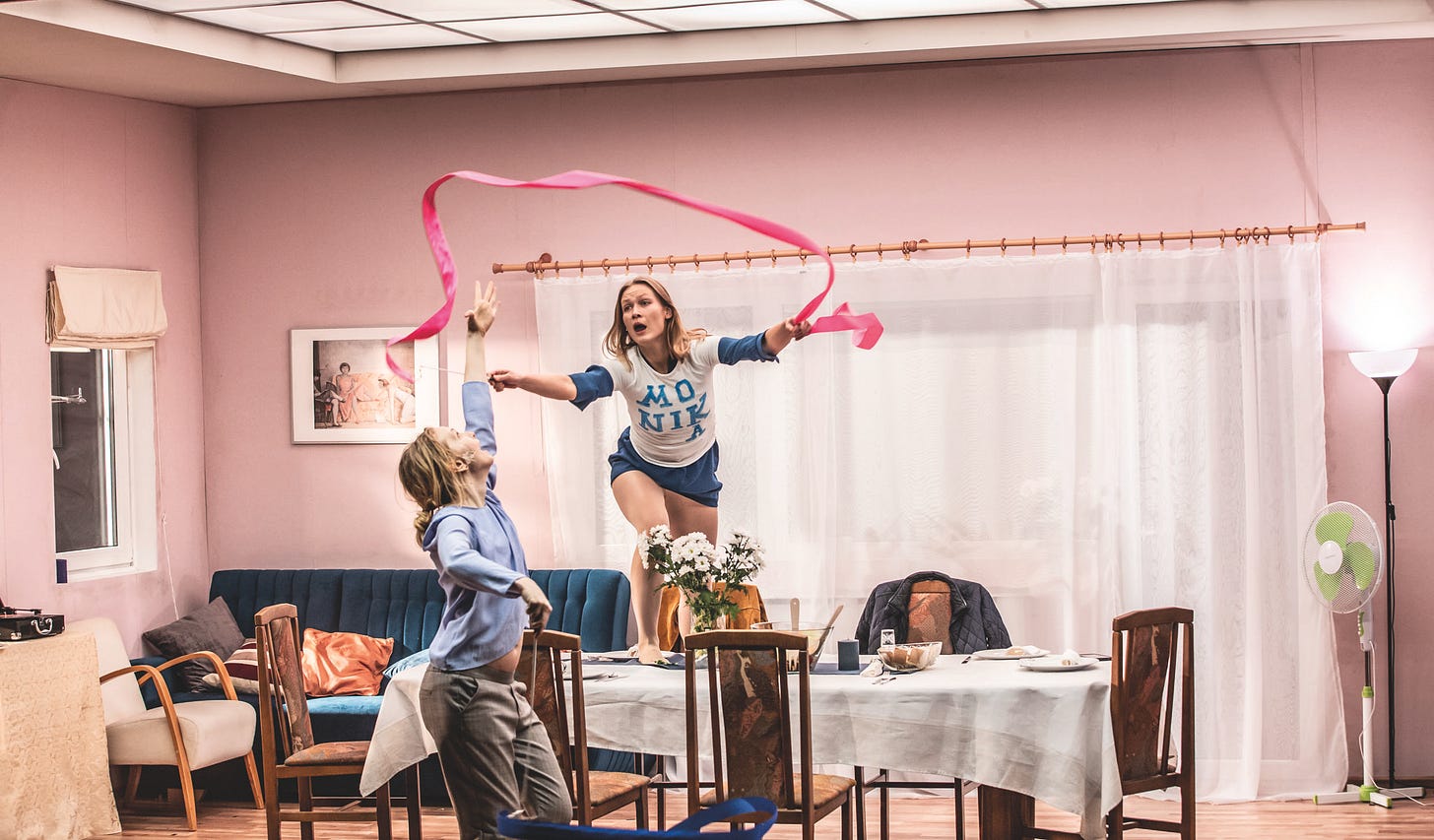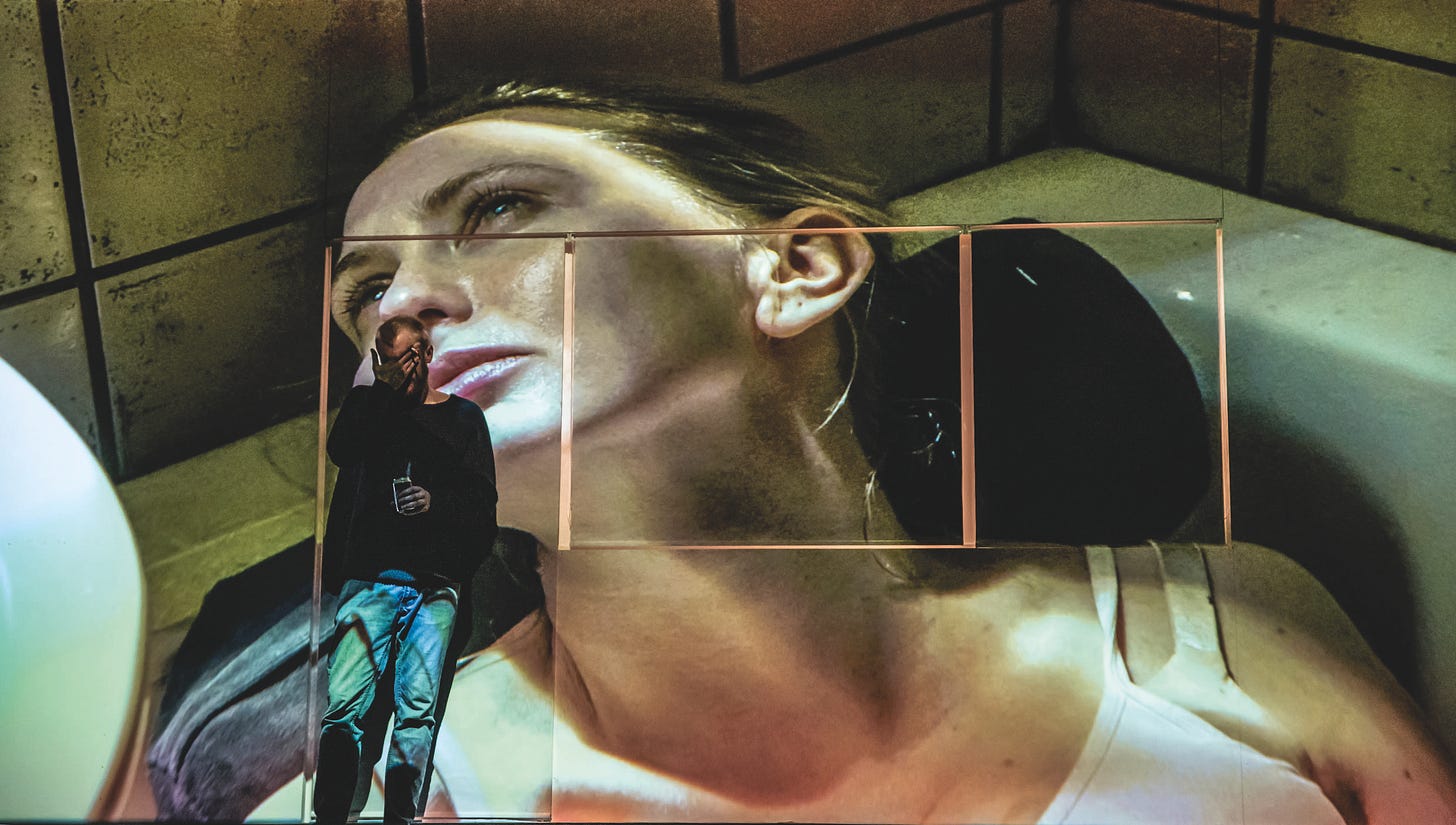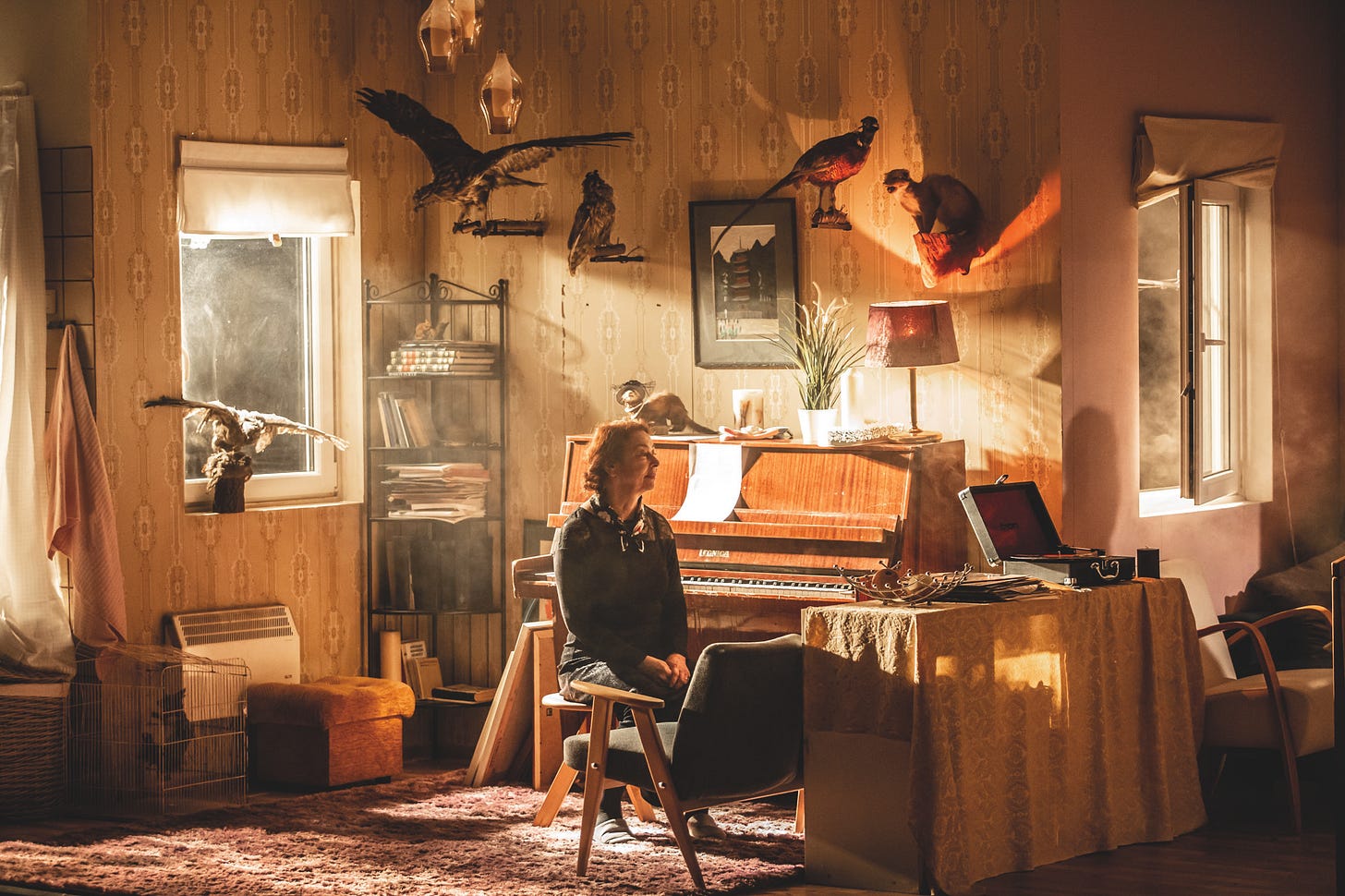Stages of grief: TR Warszawa's Pieces of a Woman
On an intense and moving Polish production that inspired a hit Netflix film.
Welcome to Café Europa, a weekly newsletter dedicated to European theatre.
This week we’re in Poland, where I went recently to see a performance of TR Warszawa’s Pieces of a Woman, ahead of its UK premiere at London’s Battersea Arts Centre. Here’s my review in The Stage and below are some more words on the show on which the 2021 Netflix film by the same writer-director team is based.
Here’s the predictable plea for support - if you find this newsletter interesting or valuable, please consider sharing it or, if you or your organisation are able, becoming a paid supporter. I recognise times are tight, so I also have a Ko-fi account, if you want to support my writing this way. I am aiming to keep as much of this newsletter free to read as possible, though there are occasional bonus editions for paid subscribers
The first twenty minutes of TR Warszawa’s Pieces of a Woman are almost unbearably intense. Maja (Justyna Wasilewska) is in labour and has her heart set on a home birth. Her waters have just broken on the bathroom floor and her husband Lars has used her best silk shirt to mop it up. The midwife has not arrived. When she finally does, it's not the woman they booked, but the younger and much less experienced Ewa, who has not assisted on a birth unaccompanied.
As Maja’s contractions become more severe, a camera circles her, capturing every moan, every woozy lurch, her breathing intermingling with the swimmy sound of a foetal heartbeat. The resulting video footage is projected on the outside wall of the set while the scene plays out inside. It's a masterful exercise in live cinema, choreographed with incredible precision, Wasilewska’s prosthetic belly looming into view, a taut cupola, the tension only partially punctuated by Lars (Dobromir Dymecki) emerging to smoke a necessary cigarette or, when things start to go wrong, to run around frantically searching for phone reception to call an ambulance.
On stage camera work can sometimes be distancing but here we're right with Maja for every wave of pain, the camera capturing her mixture of exhaustion and determination to give birth on her own terms. It's at once highly convincing and incredibly distressing. The audience watch with their breath collectively held.
Created by Hungarian playwright Kata Wéber and her director and filmmaker husband Kornél Mundruczó, and produced by renowned Polish theatre company TR Warszawa, Pieces of a Woman premiered in 2018 and has gone on to become one of the most successful shows in their repertoire, recently notching up 100 performances. The text was written in Hungarian and translated into Polish with a translator present in rehearsals, especially important given the rawness of some of the material.
In 2021, Wéber and Mundruczó reworked the play for Netflix, transplanting it to an American setting. Its star, Vanessa Kirby, was Oscar nominated for her performance. As well as drawing on her own personal experience of miscarriage and interviews conducted with women who had lost children (she talks about here research in this Playlist interview), Weber was inspired by the trial of Hungarian midwife and homebirth advocate Agnes Gereb. Initially she set out to write a play that explored Gereb’s story more directly, as she explains in this interview in Vogue, the play evolved into one that explores the psychological consequences of such a loss and the idea of survival. While the film spends more time on the protagonist– renamed Martha – and her decision of whether or not to pursue legal action against the midwife, the stage production explores the way loss affects both Maja and her wider family.
Family ties
After the intensity of the opening scene, Mundruczó allows some air into the theatre by opening up the set, with stage technicians wielding drills removing various panels, all coordinated by Magdelena Kuta, who plays Maja’s mother.
Monika Pormale’s set depicts in considerable detail the interior of Maja’s mother’s apartment. There’s a piano, a dining table, a kitchen which looks like it’s in frequent use, and corner devoted to taxidermy, including various dusty eagles and a one-eyed weasel. Kudos to the creators of the world’s most diabolical stuffed hedgehog. It’s very long and wide, creating a kind of letterbox effect. (I am told there is a slightly smaller version for touring). As the technicians reveal the full extent of the set, Maja’s mother busies herself straightening rugs and micro-managing. We later discover she is, tellingly, into what she calls ‘home-staging’, prettifying interiors by banishing the unsightly.
The focus of the show also opens up, from ultra close-up on Maja and her pain, to encompass the whole family: Maja’s sister Monika (Agnieszka Żulewska), a vegan with political ambitions who believes in the power of the church to “rebuild” Polish society, their respective partners and their cousin, a young lawyer. The directorial mode changes too, shifting from the cinematic to something more semi-televisual with conversations overlapping and lots of salad chopping, a style of detailed realism reminiscent of the work of Alexander Zeldin.
Weber presents us with a layered family tapestry, allowing the various relationships and dynamics to slowly unfold. We get a sense of the rivalries between the sisters, and the way Lars – who is both an outsider by virtue of being originally from Norway, and a former addict in recovery – is barely tolerated, even though Monika’s husband is something of a menace himself, and the sisters’ complicated relationship with their mother who is probably in the early stages of dementia.
Being in the family home, surrounded by their childhood things, amplifies all this. Maja comes across an old hand puppet and uses it to say things she cannot say herself. The sisters discover their old rhythmic gymnastics ribbons in a box and perform their old routine to kitsch Euro classic Felicita, suddenly girls again, dancing around the dining room table. (This is the second production I've seen this year to deploy the unarguable charms of Felicita at an emotionally pivotal moment, the first being Jernej Lorenci 's Orpheus).
Meanwhile the men knock back the vodka and discuss the merits of David Bowie’s Warszawa. Lars flirts, by way of foot massage, with the cousin who has clearly been invited to lay out the case to Maja to take the midwife to court and seek compensation. Underscoring everything is the sense that Maja’s family think that she is not grieving in a proper way, not adequately playing the part of a woman who has lost a child. Eventually this comes to an explosive head with passive aggressive remarks giving way to accusations. This need for women - and it is almost always women of whom this is asked - to be seen to grieve, to shed tears on demand, has not left us. You see it in trial coverage still. The play poses the question: how much grief is enough for a loss so appalling, how many tears would be sufficient?
A little light
This could have been an unremittingly gruelling piece of theatre but it’s really not. Weber and Mundruczó allow light and humour into the situation. There’s a surprising amount of laughter in the piece, much of it generated by Lars and his ability to spread literal shit through the pretty living room. .
As the family wait for the duck to cook, they bicker and reminisce, the tone sometimes hurtful, sometimes warm, in the way family gatherings can often be, love and festering resentment intermingling over the dinner table. We get a real sense of the way pain flows through generations, the sisters’ anxiety that their mother did not love them, or certainly did not show her love in demonstrable ways, but also moments of unity and understanding, particularly between the women of the family. It is play about loss and the toll it takes, yes, but also living with loss, living through it - living,
The naturalism of the piece is briefly disrupted by an eerie sequence in which an overwhelmed Maja retreats to the shower and enters a kind of nightmare space (the only part of the production that struck a wrong note for me). The majority of the horror comes from the kind of Succession-calibre emotional wounding that only siblings can inflict on one another.
Wasilewska negotiates her character’s emotional shifts with dexterity, moving from anguish to anger to utter numbness and back again, while Dymecki expertly mixes levity with something more pathetic - he also does a grimly realistic onstage vomit. The actors wear their roles like old clothes, clearly comfortable in the skins of the characters. Close-knit ensembles often excel at portraying tangled families, interacting with each other with a degree of ease that comes from proximity, and that’s the case here.
TR Warszawa were once regulars in London, with their productions of 4.48 Psychosis, Nosferatu and TEOROMAT all playing the Barbican between 2010-12. This production marks their return to London in a fair few years, and the fact that it will be at Battersea Arts Centre is indicative of how the theatrical landscape has shifted in respect to programming international work in the UK. BAC has recently presented Florentina Holzinger, Milo Rau and Miet Warlop, but this is a different offering, and it’s notable that’s it’s receiving its UK premiere at BAC (in collaboration with the Adam Mickiewicz Institute)
A note on content warnings
It's impossible to write about the production like this without stressing the visceral and upsetting nature of those opening moments. After the birth scene at the performance in Warsaw, there was a commotion at the back of the theatre. It turned out that two women had fainted and the show had to be stopped so they could be tended to; both were fine, and one came back for the second half. Afterwards I asked if this was a common occurrence with this show and was told that while it was not unheard of for people to faint, particularly in hot venues, it did not happen often, and this was the first time that two people had fainted in one performance.
That said, if ever a production made the case for the provision of detailed and careful content warnings, it's this one. It's a production that deals with something incredibly emotive in a way that is both intense and intimate, and that will obviously have an impact on people, particularly I’d imagine, on those with personal experience of trauma. Battersea Arts Centre already operates a relaxed venue policy and, if audiences feel overwhelmed during the performance, it is possible to leave the theatre and make use of a chill out space (and, crucially, come back). There will also be additional content guidance on screens as people head into the venue.
Content warnings seem to excite such strong feelings and have become weirdly co-opted into the culture war in a way I find baffling. There have been numerous articles about them, like this one and this one. Here’s one I wrote. Fergus Morgan was among the few people to actually ask people who found them valuable, why they found them valuable.
It's vital that spaces exist to talk about and portray the most painful of subjects. A theme in the play, and something which Weber herself has spoken about, is that people don’t have the words to accommodate such a loss, so they don’t speak about it at all. Shame, guilt and stigma remain. Weber has said that she hopes the play will help “dissolve the centuries-old consensus regarding appropriate forms of mourning.” Content warnings, there for those who need them, easily ignorable for those who don’t, can only facilitate that process.
This week in European theatre
A round-up of festivals, premieres and other upcoming events over the next seven days.
Polis Festival – This Italian festival has a different international focus every year. This year it looks at the German-speaking scene with performances from She She Pop and Rimini Protokoll. It kicked off on 7th May and runs until 12th at venues around Ravenna.
Masterclass –Irish company Brokentalkers and New York-based artist Adrienne Truscott bring their hilarious treatise on male genius, misogyny and who gets to dominate a room to London’s Southbank Centre this week. This was, in my view, one of the stand-out shows of the 2022 Edinburgh fringe – here’s my somewhat gushing review for The Stage. London audiences can catch it from 9th-12th May.
La Cripta dei Cappuccini (The Emperor’s Tomb) - Conceived and directed by Giacomo Pedini, artistic director of Mittelfest, this adaptation of Joseph Roth’s 1938 novel is part of a trilogy of work created to mark Gorizia in Italy and Nova Gorica in Slovenia being jointly awarded European Capital of Culture 2025. The show will premiere on 11th May at Teatro Comunale Giuseppe Verdi in Gorizia.
Thank you for reading! You can contact me about anything newsletter-related on natasha.tripney@gmail.com




